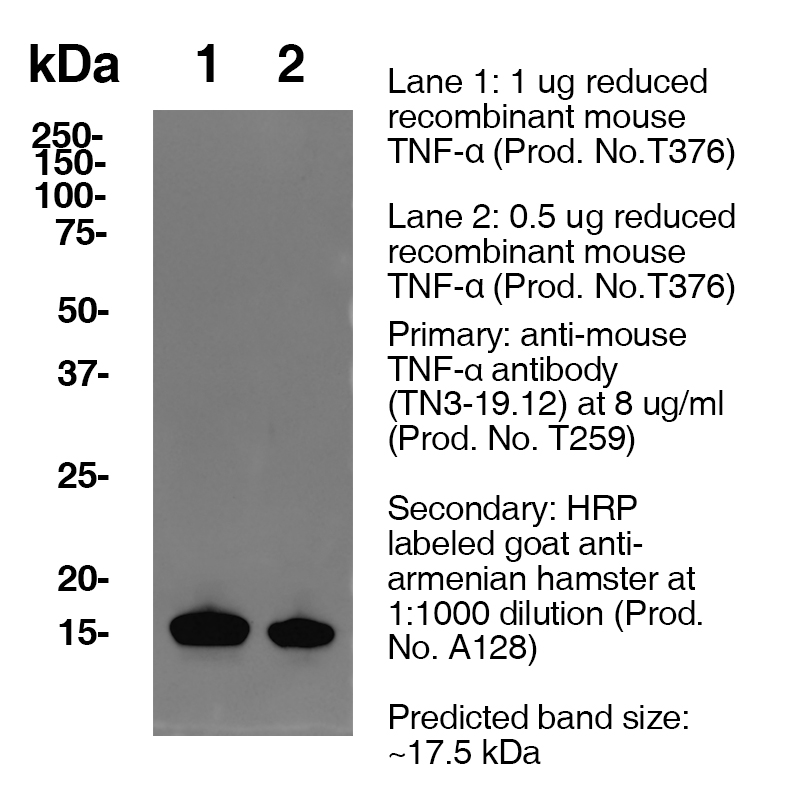Anti-Mouse TNF-α - Purified
| Code | Size | Price |
|---|
| LEI-T259-100ug | 100 ug | £179.00 |
Quantity:
| LEI-T259-500ug | 500 ug | £250.00 |
Quantity:
Prices exclude any Taxes / VAT
Overview
Host Type: Hamster
Antibody Isotype: IgG
Antibody Clonality: Monoclonal
Antibody Clone: TN3-19.12
Regulatory Status: RUO
Target Species: Mouse
Applications:
- Enzyme-Linked Immunosorbent Assay (ELISA)
- Flow Cytometry
- Western Blot (WB)
Shipping:
Ambient
Storage:
This purified antibody is stable when stored at 2-8°C. Do not freeze.
Images
Further Information
Antigen Distribution:
TNF-α is secreted by macrophages, monocytes, neutrophils, T cells, B cells, NK cells, LAK cells.
Concentration:
0.5 mg/ml
Conjugate/Tag/Label:
Purified
Format:
This purified antibody is formulated in 0.01 M phosphate buffered saline (150 mM NaCl) PBS pH 7.4, 1% BSA and 0.09% sodium azide as a preservative.
Formulation:
This purified antibody is formulated in 0.01 M phosphate buffered saline (150 mM NaCl) PBS pH 7.4, 1% BSA and 0.09% sodium azide as a preservative.
Immunogen:
E. coli-expressed, recombinant mouse TNF-α
Long Description:
CD120 can refer to two members of the tumor necrosis factor receptor superfamily- CD120a (TNFR1) or CD120b (TNFR2). CD120a is a 55kD Type I transmembrane protein receptor that binds both TNF-α and TNF-β (LT-α). In association with TRADD and RIP, the receptor crosslinking induced by TNF-α or TNF-β trimers is vital for signal transduction, leading to apoptosis, NF-?B activation, increased expression of proinflammatory genes, tumor necrosis, and cell differentiation depending on cell type and differentiation state. CD120b is a 75 kD type I transmembrane protein that binds both TNF-α and TNF-β. In conjunction with TRAF1 and TRAF2, the receptor crosslinking induced by TNF-α or TNF-β trimers is critical for signal transduction that may lead to apoptosis, NF-kB activation, increased expression of proinflammatory genes, tumor necrosis, and cell differentiation depending on cell type and differentiation state. TNF-α is a 17.5 kD protein that mediates inflammation and immunity caused by the invasion of viruses, bacteria, and parasites by initiating a cascade of cytokines that increase vascular permeability, thus bringing macrophages and neutrophils to the site of infection. TNF-α secreted by the macrophage causes the blood to clot which provides containment of the infection. TNF-α binding to surface receptors brings about various biologic activities that include cytolysis and cytostasis of many tumor cell lines In vitro, hemorraghic necrosis of tumors In vivo, increased fibroblast proliferation, and enhanced chemotaxis and phagocytosis in neutrophils. TNF-β (LT-α) is a 25 kD protein that has a significant impact on the maintenance of the immune system including the development of secondary lymphoid organs. TNF-β has dual functions. It may function to prevent growth of cancer cells or it may facilitate the development of tumors. TNF-β is involved in the regulation of cell survival, proliferation, differentiation, and apoptosis and, if unregulated, can result in a constantly active signaling pathway, resulting in uncontrolled cellular growth and creation of tumors. Additionally, TNF-β is involved in innate immune regulation and has been shown to prevent tumor growth and obliterate cancerous cell lines.
Target:
Tumor Necrosis Factor-α
References
1. El-Harith el-HA et al. (2004) Saudi Med J. 25: 135
2. Adolf GR et al. (1990) Infec Immun. 58: 3996



